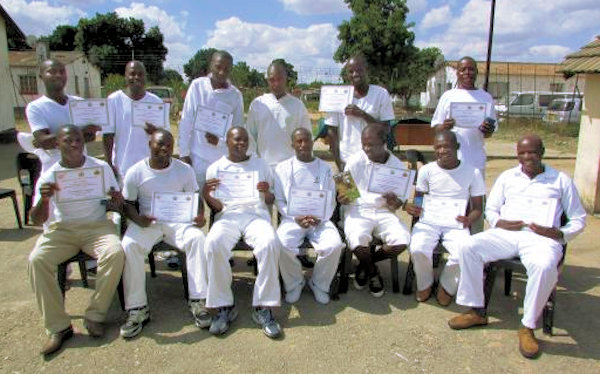United Methodist program in Zimbabwe equips inmates to be farmers upon release from prison.
KUDZAI CHINGWE
United Methodist News Service
Inmates at a prison in Harare, Zimbabwe, have learned to grow food through a program organized by The United Methodist Church and the Zimbabwe Prison and Correctional Service.
This year, 17 inmates at Kentucky Prison graduated with certificates in horticulture after completing the one-year nutritional gardening course.
The program, which receives other support, aims to provide prisoners with the knowledge to grow food while they are in prison and after they are released, said the Rev. Simon Matara, connectional ministries chairperson of the Harare East District of The United Methodist Church. Matara spoke at a May graduation program.
“I want to thank all the partners in this program for coming up with a brilliant idea to equip our inmates who can now grow their own food as supplement to the normal rations and also use the skills later to their benefit,” he said.
He said that although inmates were entitled to free food provided by the government, the economic situation in the country meant the prison system faced difficulties, which was why the prison and correction system wanted to offer the program.
Luke Mhere, chief correctional officer in the Zimbabwe Prison and Correctional Services, said the institution has adopted an approach to equip inmates with skills rather than simply punishing them. Mhere said equipping inmates with skills can help them successfully rejoin society and live as law-abiding citizens.
“If one acquires some life skills while in prison, it returns the confidence required to rejoin the society,” he said.
One of the beneficiaries, Moses Makina, said the acquiring of horticulture skills was a milestone in the lives of prisoners.
“As prisoners, we are delighted and we have seen that there is no condemnation in being a prisoner, as our lives will never be the same,” he said.
The one-year program started in 2016 with the growing of potatoes, tomatoes, onions, carrots, butternuts, cabbage and cucumbers, but was delayed when the institution faced some challenges with its water supply. The inmate gardeners had to reduce the size of their gardens to save water, so they graduated in May instead of December.
Last Updated on July 17, 2017

